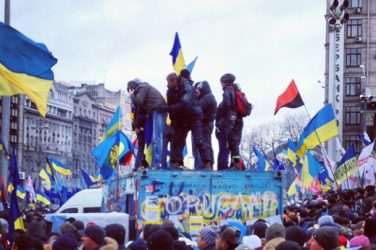We in the west have criticized Russia for a lot over the past year. The sanctions that were supposed to threaten Russian president Vladimir Putin seem to only worsen the relationship and make the tensions worse, while the alternative of sitting back and watching also seems wrong. Yet, the Eastern European countries are making the relationship with Russia much worse, even though they have not shown full support for sanctions alongside the US and the rest of the EU. Their verbal critique, such as comparing Putin with Hitler, along with their military powers, are certainly marking an end to what was formerly a good relationship.
It has been a year since the Ukraine crisis started. The West’s relationship with Russia is becoming chillier and more aggressive, even on the edge of a new Cold War according to some, with the conflict worsening each day. Eastern Europe shares the West’s views towards Russia, partly for fear of being annexed themselves, and therefore joins the hysteria of pointing fingers at Russia’s cold people and un-democratic system of government.
Russians think of the election as democratic, even though we in the West have heard that Russia is far from a democratic country. A study shortly after the dissolution of the USSR found that “majorities [of Russians] now favour a strong leader over a democratic government, express little sense of political empowerment, and lack confidence in their political and government institutions.” But this has clearly changed a lot over the past year. According to one of The Economist’s articles, “Putin’s people” from December 2014, Putin’s popularity has soared since the Ukraine crisis.”
The West’s relationship with Russia is becoming chillier and more aggressive, even on the edge of a new Cold War according to some, with the conflict worsening each day.
The West keeps attacking Russia and continuing to impose sanctions that will probably only really affect the working and middle classes of Russia, aka the civilians as always. Meanwhile Putin’s speeches on keeping beloved Russia strong against all resistance will of course appeal to the Russians. No one else is on their side.

Truth be told, there are a lot of Russians, and Russian-speaking people in Ukraine. And many of them want to be a part of the world’s largest country. The West should not deny them this, even though they are extremely sceptical towards this minority. The long history and shared culture seem to be completely forgotten, or maybe ignored. At the same time, it is important not to forget the Ukrainians who want to be a part of the European Union, with a fresh new start.
What is scaring Eastern Europe is that many of those countries also have large proportions of Russian-speaking people, and a long shared history with Russia during the Soviet period? Take Lithuania, for instance. Their president, Dalia Grybauskaite, likened Putin’s strategies in Ukraine to those of Stalin and Hitler, said that he would also take other Eastern European countries along the way, and that Europe is at war with Russia in a magazine interview. These are serious and exaggerated accusations, but there are many Europeans who agree with her. To take a bit more of an absurd example into the picture, the booing from the audience during Russia’s turn in the Eurovision song contest in Denmark last year certainly reflected the strained relationship we now have with Russia.
But then there is a question of whether an independent Ukraine would find identity as part of the EU. Would they manage to fit in and feel like they belong? A 1993 study on East Germans, who had then quite recently become separated from the Soviet Union, found some interesting results. They were asked whether they felt like second class citizens. A stunning 48% answered “sometimes”, 33% “often” and only 16% answering “never” and 3% “don’t know”. And that was within Germany, their own country. The results are probably quite different today, but it proves that integration takes time, and might not even really work in the end.
There is a question of whether an independent Ukraine would find identity as part of the EU. Would they manage to fit in and feel like they belong?
The West has not exactly been encouraging before when it comes to Eastern European countries joining the EU; the poorer countries can harm the trade and union economy for some member states, and have therefore been excluded previously. But that has changed over the past few decades. Only take Poland; it is one of the countries which has proved that EU membership can help the economy and social standards within the country. Besides, it also makes it easier to move and find work within the EU when from a member state. This is definitely something Eastern Europe, and Ukraine no doubt, will want to achieve as well. It has become beneficial for the West to accept workers from Eastern Europe now, as they help the economic growth of western countries. This also makes it easier for Eastern Europeans to seek work and a better life in the West rather than turning to Russia.
Only when the West started to encourage Ukraine to abandon Russia and become a part of the EU did the chaos really start. As usual, the West messed things up and cannot seem to make them better.
Yet the propaganda from the state that the Russians receive through their daily news, along with the one-sided reporting Europeans read, from for example Sky News, makes the prospect of softening the relationship more difficult.
Barely a day passes without seeing headlines in the western media of Russian aggression, with military submarines or military jets being seen near a country’s border. The Times also reported that there have never been more Russian spies in UK since the Cold War. Eastern Europe tries to exclude and ignore Russia more and more, in the hope of becoming invisible to them. The atmosphere seems to be a mixture of fear, aggression and provocation while prospects of easing the tension seem to be thin on the ground.









